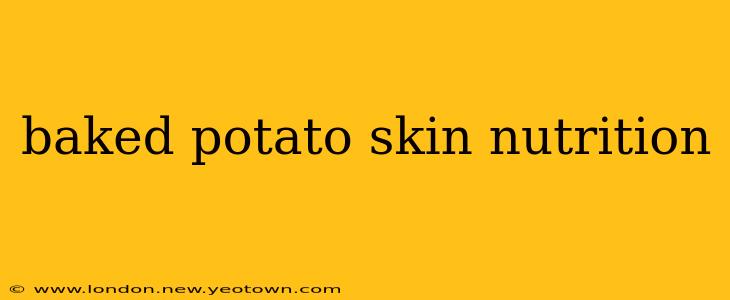Let's be honest, baked potato skins often get a bad rap. We picture them loaded with cheese, bacon, and sour cream – a delicious but decidedly unhealthy indulgence. But what about the humble potato skin itself? Before the toppings arrive, what's the nutritional story behind this often-overlooked part of the spud? It's more interesting than you might think!
My journey into the world of baked potato skin nutrition started with a simple question: are they actually good for you? The answer, like most things in nutrition, isn't a simple yes or no. It depends. But let's delve into the details, exploring what makes potato skins tick and answering some frequently asked questions.
Are Baked Potato Skins Healthy?
This is the million-dollar question! The short answer is: it depends on how you prepare them. Plain baked potato skins are a surprisingly good source of several essential nutrients. They boast fiber, vitamins, and minerals, offering more than just empty calories. However, the moment you start loading them with high-fat, high-sodium toppings, that nutritional profile takes a nosedive.
Think of it like this: the potato skin is a blank canvas. You can create a masterpiece of healthy snacking, or a calorie-laden indulgence. The choice, and the nutritional outcome, is entirely in your hands.
What Nutrients are in Baked Potato Skins?
Let's focus on the unadorned potato skin itself. These crispy delights are packed with:
- Fiber: Potato skins are a good source of dietary fiber, contributing to digestive health and helping you feel full and satisfied.
- Vitamin C: An important antioxidant, vitamin C protects your cells from damage.
- Potassium: Essential for maintaining healthy blood pressure.
- Vitamin B6: Plays a critical role in brain development and function.
- Iron: Crucial for red blood cell production.
These nutrients are present in larger amounts compared to the potato flesh, making the skin a surprisingly nutrient-dense snack.
How Many Calories are in Baked Potato Skins?
The calorie count for baked potato skins varies greatly depending on size and preparation. A single medium-sized potato skin, baked plain, contains approximately 50-70 calories. However, add cheese, sour cream, bacon, and chili, and that number can easily jump to 200-300 calories or more per serving.
Are Baked Potato Skins Good for Weight Loss?
Plain baked potato skins can certainly be incorporated into a weight-loss diet. Their fiber content promotes satiety, helping you feel fuller for longer and potentially reducing overall calorie intake. However, the high-calorie toppings can quickly negate these benefits. For weight management, it's crucial to choose healthy toppings or simply enjoy them plain with a sprinkle of herbs and spices.
Are Baked Potato Skins Gluten-Free?
Yes, naturally baked potato skins are inherently gluten-free. However, always check the ingredients of any added toppings, as some sauces or cheeses may contain gluten.
How to Make Healthy Baked Potato Skins
To maximize the nutritional benefits and minimize the drawbacks, consider these tips:
- Bake them plain: Enjoy the natural flavor of the potato skin with a light seasoning of herbs and spices.
- Choose healthy toppings: If you must add toppings, opt for healthier options like salsa, Greek yogurt, or a small amount of shredded low-fat cheese.
- Control portions: Stick to a reasonable serving size to manage calorie intake.
By understanding the nutritional profile of baked potato skins and making mindful choices about preparation and toppings, you can enjoy this tasty snack without sacrificing your health goals. The crispy, flavorful bite is well worth the effort, provided you approach it thoughtfully. Remember, the humble potato skin is a testament to how a seemingly simple food can be both delicious and surprisingly nutritious – if prepared correctly!

